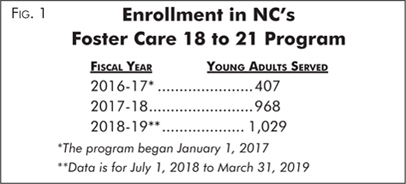 |
 |
 |
Vol.
25, No. 2
April 2020
NC Seeks to Serve More with Foster Care 18-21 Program
North Carolina wants to bring the benefits of its Foster Care 18-21 program to more young adults. This voluntary program gives youth in foster care the option to continue receiving services, including monthly foster care maintenance payments, until they reach age 21.
As Figure 1 shows, participation in Foster Care 18-21 has grown steadily. In its first six months, it served 407 young adults. Enrollment climbed to 968 in its first full year and increased further in 2018-19 (NCDHHS, 2019).

Improved Outcomes
Since the Foster Care 18-21 program began, the number of 18-year-olds exiting foster care in North Carolina without achieving permanence has fallen dramatically. As Figure 2 shows, the number of youth "aging out" began rising more than a decade ago. In 2015-16, the year before the Foster Care 18-21 program debuted, 575 youth aged out. Last year, that number dropped to 391 (Duncan, et al., 2019).
We Can Do Better
We celebrate this change, but we can do even better. Research shows that youth who voluntarily enter extended foster care after they turn 18 are much more likely than their peers who exit foster care to have a positive housing, employment, and education status (Netzel & Tardanico, 2014). Every single young person in foster care should get the support they need to succeed as an adult.
Increasing the use of the Foster Care 18-21 program can help us achieve this goal. If you or your agency has questions about how to grow the number of youth it serves with this program, contact the NC Division of Social Services' Erin Conner (Erin.Conner@dhhs.nc.gov).

